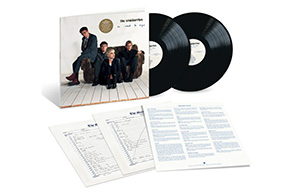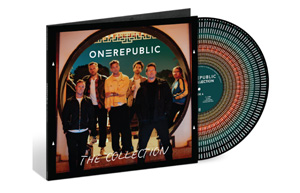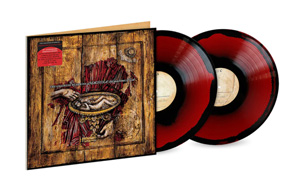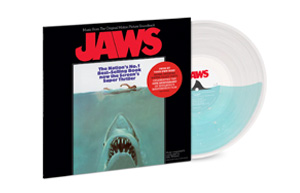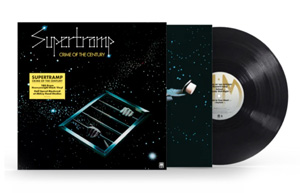Best Def Jam Songs: Essential Tracks That Define Hip-Hop History
The pre-eminent label for much of hip-hop’s history, the best Def Jam songs are the evolution of the genre.
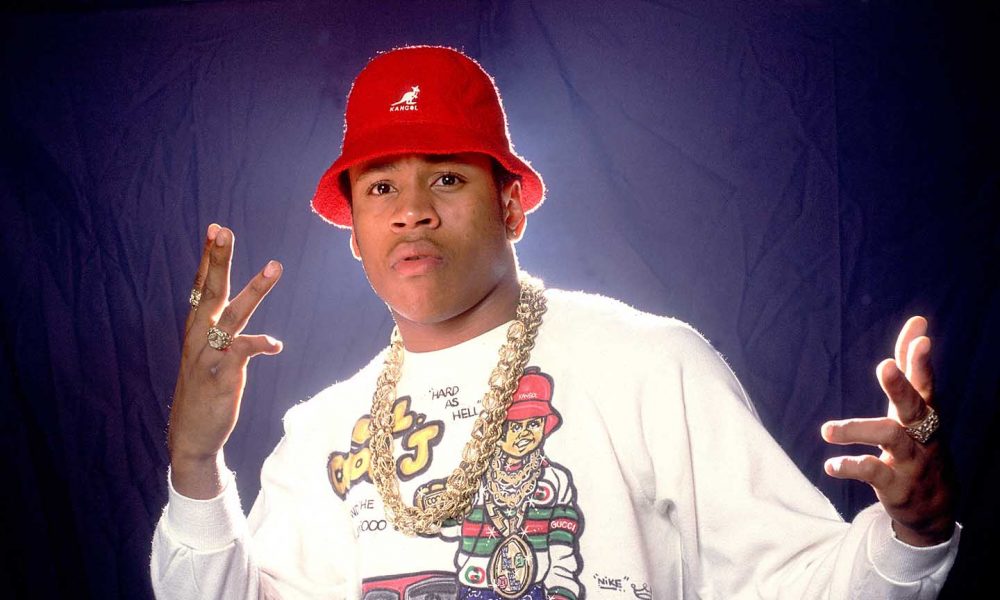
There’s a kind of magic about coming across the Def Jam 12” sleeve at a record store: that Gretchen Viehmann-designed logo depicting the control arm of a record player against that specific shade of maroon is synonymous with excellence and quality to any hip-hop fan. Def Jam Recordings has been the preeminent hip-hop label for the better part of the last three and a half decades, and the best Def Jam songs define hip-hop’s evolution over that period. For a genre where tastes can (and do) change like the wind, this is an unparalleled accomplishment.
From the drum machine-and-scratching sound of mid-80s New York, through the sampled-based golden era, to west coast G-Funk, Dirty South, trap, and beyond, Def Jam has been there, churning out the hits. But more important than the countless gold and platinum plaques produced by this continually evolving company is the cultural impact of the songs, which take us back to specific times and places in our lives.
There is a strong chance you remember where you were when you first heard the lines “LL Cool J is hard as hell!”, “Bass! How low can you go?” and “Regulators! Mount up.” The best Def Jam songs provide a snapshot of the label’s enormous legacy, but they are but a sampling (no pun intended) of label’s legacy.
Listen to best Def Jam songs on Apple Music and Spotify.
49: Justin Bieber (featuring Diplo and Skrillex): “Where Are Ü Now” (2015)
When famed electronic music producers Diplo and Skrillex came together, christening themselves Jack Ü, they began working with a plethora of artists, including 2 Chainz, Kiesza, and teen-idol-turned-pop-powerhouse Justin Bieber. “Where Are Ü Now?” features Bieber’s gentle vocals filtered through heavily processed effects, over a minimal beat and bare-bones electronic instrumentation.
48: Rihanna (featuring Calvin Harris): “We Found Love” (2011)
What could be more romantic than two thrill-seekers finding “love in a hopeless place”? On her sixth studio album, Talk That Talk, Rihanna teamed up with Scottish DJ/producer Calvin Harris for “We Found Love.” While it has all the hallmarks of your standard uptempo house track, the song sneaks in more subversive topics of drugs and the addictive side effects of relationships, as tackled in the music video. To say it connected with the public is an understatement: “We Found Love” sold 20 million copies worldwide, becoming one of the best-selling singles by anyone, and earning its place among the best Def Jam songs in the process.
47: Frank Ocean: “Thinkin Bout You” (2012)
Frank Ocean first burst onto the scene in the 00s, with Odd Future Wolf Gang Kill Them All, the LA hip-hop collective that also birthed Tyler, The Creator, Earl Sweatshirt, and Syd Tha Kyd, but his debut album, Channel Orange is what changed the game. Its genre-shifting mix of hip-hop, R&B, and electronica paved the way for a whole sub-genre, and his intimate tales of heartbreak and queer love signaled a seismic change in urban music. “Thinkin Bout You” is easily one of the best Def Jam songs of the 2010s.
46: Big Sean (feat E-40): “I Don’t F__k With You” (2015)
Big Sean was brought to Def Jam via the Getting Out Our Dreams Music (GOOD Music) imprint. Sean worked with hip-hop legend E-40 on “I Don’t F__k With You,” off his third album Dark Sky Paradise. The expletive-laced anthem samples “Say You Love Me One More Time” by DJ Rogers and “September” by Earth, Wind And Fire. In the music video, Big Sean portrays a football player while E-40 plays a commentator. There’s a metaphor hidden in there somewhere.
45: YG (feat Drake): “Who Do You Love?” (2014)
YG grew up in the same neighborhood of Compton and, roughly two decades later, joined the same gang as DJ Quik. Like his elder, YG ended up selling millions of records and churning out some of the best Def Jam songs. “Who Do You Love?” off his debut album, My Krazy Life, features Drake spitting a verse eerily reminiscent of “Playaz Club” by Rappin’ 4-Tay. The DJ Mustard production helped My Krazy Life get to No. 2 on the Billboard 200 album chart – a feat that very few of YG’s Compton forefathers were able to accomplish.
44: Jeremih (feat YG): “Don’t Tell ’Em” (2014)
Singer, songwriter, rapper, producer – what can’t Jeremih do? After the Chicagoan signed to Def Jam in his early 20s, his debut single, “Birthday Sex,” went triple-platinum and landed at No. 4 on the Billboard Hot 100. Electro-R&B single “Don’t Tell ’Em,” from his third album Late Nights, features Compton rapper and fellow Def Jam artist YG. For those keeping score, it also went triple-platinum, bolstered by its interpolation of “Rhythm Is A Dancer” by early 90s Eurodance group Snap!.
42: 2 Chainz: “Used 2” (2013)
Tauheed Epps began his recording career as one half of Atlanta-area rap group Playaz Circle, performing under the name Tity Boi alongside Dolla Boy. After releasing music on Ludacris’ Disturbing Tha Peace label, which was by then a subsidiary of Def Jam, Tity Boi became solo artist 2 Chainz, breaking out in 2012 with Based On A TRU Story. From his follow-up, BOATS II: Me Time, “Used 2,” features a 2 Chainz flow stylistically similar to Juvenile’s “Back That Azz Up”: a sonic throwback to late-90s Southern hip-hop.
41: The-Dream: “1977” (2012)
Terius Youngdell Nash, aka The-Dream, has experienced massive success as a songwriter for pop artists Britney Spears, Ciara, Rihanna, Beyoncé, Mariah Carey, and Justin Bieber. As a solo artist, the North Carolinian’s unique brand of R&B was on full display across five albums for Def Jam/Radio Killa between 2007 and 2013. Tearjerker “1977,” ostensibly named for the author’s year of birth, was recorded one year after The-Dream’s highly publicized marriage to actress/singer Christina Milian ended in divorce.
40: Logic feat Alessia Cara and Khalid: “1-800-273-8255” (2017)
After many of his fans told him that he saved their lives, Logic wondered what would happen if he actually tried to save lives. “1-800-273-8255” (named for the phone number of the National Suicide Prevention Lifeline) takes on the perspective of someone who wants to take his own life and is later talked out of it with the help of singer-songwriters Alessia Cara and Khalid. Taken from Logic’s No. 1 album Everybody it marked a new era of socially-conscious hip-hop.
39: Young Jeezy: “Crazy World” (2008)
One month after the start of the Great Recession in 2008, Atlanta-based rapper Young Jeezy (whose name was later shortened to Jeezy – we can’t all stay young forever) released The Recession, his follow up to 2006’s The Inspiration. Opening with a plea to vote for “Barrack O’ Drama,” Jeezy paints a bleak picture of the criminal justice system and alludes to his conviction for narcotics possession as a minor. The Recession hit a nerve with the public and became his second chart-topping album. That same month the stock market crashed.
38: Ja Rule (feat Ashanti): “Always On Time” (2001)
Despite the South’s rising dominance in the 21st Century, New York continued producing internationally recognized talent. Hailing from Queens, Ja Rule signed to Def Jam via mogul-in-the-making Irv Gotti’s Murder Inc. For the single “Always On Time,” the gruff-voiced Ja Rule employed the tested formula of verses rapped by male MC and choruses sung by R&B divas. In this case, the singer was a still relatively unknown Long Island native named Ashanti. After releasing her solo debut a year later, Ashanti joined Ja Rule as a multi-platinum recording artist for Def Jam/Murder Inc.
37: Desiigner: “Panda” (2015)
While hip-hop has continually evolved since its birth, the mid-2010s saw a generational shift like never before. Identified by their choppy flows (often in triplets) and intentionally slurred lyrics, this new crop of stars was initially derided as “mumble rappers” by older hip-hop fans. Among this set was Desiigner, who came to Def Jam through GOOD Music. With lines like “Sellin’ bar, candy/Man I’m the macho like Randy,” his gargantuan No. 1 hit “Panda” reveals a clear throughline from Nice & Smooth’s 1991 hit “Sometimes I Rhyme Slow,” whether or not the older generation wants to admit it.
36: Vince Staples: “Norf Norf” (2015)
North (or “Norf”) Long Beach rapper Vince Staples was discovered by Odd Future around 2009 and was featured on some of their records before he embarked on a solo career. Signed to Def Jam by way of No ID’s ARTium Recordings, Staples’ debut album Summertime ’06 looked back on his life as an impoverished 13-year-old. Produced by Clams Casino (Michael Volpe), “Norf Norf” focuses on the MC’s time spent gangbanging, with references to Nate Dogg and the seminal film Boyz N The Hood.
35: Ludacris (feat Mystikal and I-20): “Move B__ch” (2001)
By the turn of the millennium, Def Jam had been absorbed into Universal Music and grouped with Island Records. It was a new era, both for the label and for hip-hop in general, as its power center drifted away from the coasts and towards the south. Russell Simmons employed Houston rap star Scarface (Brad Jordan) to head the new Def Jam South imprint, and Jordan’s first order of business was signing a hot radio DJ-turned-MC from Atlanta named Ludacris. Even with its brash lyrics, the power of a simple hook and a good beat should never be understated, and “Move B__tch” went straight to the Top 10. Featuring rapper Mystikal and fellow Georgia rapper I-20 (named after the Atlanta interstate highway), “Move B__ch” helped Ludacris’ third album, Word Of Mouf go triple-platinum. The south had risen.
34: Pusha T (feat Kendrick Lamar): “Nosetalgia” (2013)
When former Clipse member Pusha T went solo in 2010, he signed with GOOD Music. All roads seemingly lead to one place in hip-hop, and with GOOD’s deal with Def Jam, Pusha was now on the label with the most expansive hip-hop catalog in history. From his second album, My Name Is My Name, “Nosetalgia” sees Pusha collaborating with Compton rapper Kendrick Lamar to offer two different perspectives of their time growing up during the crack epidemic – the former sold it and the latter saw family members struggle with addiction. The guitar hook is a pitched-up sample from Bobby Bland’s 1973 soul ballad “(If Loving You Is Wrong) I Don’t Want to Be Right.” Two years later, Pusha T became the president of GOOD Music.
33: Method Man and Redman: “How High” (1995)
What happens when two of Def Jam’s biggest stars join forces? The answer is songs about weed, record sales, a spinoff movie, a spinoff TV show, and more record sales. It all started with a single that originally featured on the soundtrack to the 1995 hip-hop documentary film The Show, which contains memorable scenes like Russell Simmons visiting Slick Rick in prison, and Wu-Tang Clan getting into a shouting match with each other on a Japanese bullet train among unsuspecting commuters. “How High” marked their debut as a duo, and the two MCs would end up releasing three albums as a duo (all on Def Jam), beginning with 1999’s Blackout!.
32: Foxy Brown (feat Jay Z): “I’ll Be” (1996)
Teenager Inga Fung Marchand was first discovered at a talent contest in Brooklyn by hip-hop production team Trackmasters, and soon found herself signing with Def Jam under the name Foxy Brown. Her first solo album, Ill Na Na, was released exactly one week after one-time friend Lil’ Kim’s debut album, both of which feature Jay-Z, who had only one full-length under his own belt at the time. Both Kim and Foxy ushered in a new era of female rappers, sporting provocative clothing and equally sexually provocative lyrics (a far cry from Nikki D and MC Lyte before them). The Trackmasters-produced “I’ll Be” was a Top 10 hit in the US and UK, propelling her debut album to platinum status and turning 18-year-old Foxy into a household name.
31: Hose: “Mobo” (1982)
Remember when Def Jam was a punk label? That is not hyperbole. When it was time for Long Island guitarist Rick Rubin’s band Hose to put out records, he released their Mobo 7” in 1982 and a self-titled 12” EP the following year. Def Jam Recordings was born. Hose bore a striking resemblance to San Francisco punk agitators Flipper – and not by coincidence. Many years later, Rubin gave Flipper a record deal on his Def American label.
30: LL Cool J: “I Need Love” (1987)
On his sophomore album, Ladies Love Cool James was able to make hard-hitting hits for the fellas like “I’m Bad,” but also soft ballad raps for the ladies with “I Need Love.” The latter became a huge crossover hit, helping Bigger And Deffer go double-platinum within a year. Its massive success released a tidal wave of copycat love raps for the remainder of the decade, none of which reached the same commercial heights as “I Need Love,” which remains one of the best Def Jam songs of the 80s.
29: Nas (feat will.i.am): “Hip Hop Is Dead” (2006)
In 1991, hip-hop group Main Source released the posse cut “Live At the Barbeque,” featuring an outrageous verse by a mysterious MC from Queensbridge who called himself Nasty Nas. It was off to the races for Nasir Jones, as his elders Large Professor, Kool G Rap, and MC Serch tried to get him a record deal. Def Jam famously passed, and Columbia Records ended up signing him. Seven platinum albums later, including the critically acclaimed Illmatic, Nas was signed to Def Jam by its new president and his one-time rival, Jay Z. The title track for Hip Hop Is Dead is a scathing indictment of the state of the genre in 2006, as Nas witnessed a shift away from its street roots and towards commercialization. A sample taken from Incredible Bongo Band’s rendition of Iron Butterfly’s “In-A-Gadda-Da-Vida” provides the musical hook on the will.i.am-produced track.
28: Onyx: “Slam” (1993)
Shaved heads, boots, slam dancing, shouted vocals. No, this isn’t a hardcore punk show; it’s a hardcore hip-hop show, and Onyx is headlining. After the Queens outfit failed to make an impact with one De La Soul-ish single on Profile Records in 1990, they brought rapper Sticky Fingaz into the fold and overhauled their look and sound. Run-DMC’s Jam Master Jay scooped them up for his JMJ imprint through Def Jam. “Slam” singlehandedly introduced the aggressive dance style to an entirely new crowd and went No.4 on the Billboard Hot 100 – an incredible achievement for a hip-hop song. One million copies and an unknown number of BIC razors later, the hip-hop world was a lot balder.
27: Method Man (feat Mary J Blige): “I’ll Be There for You/You’re All I Need To Get By” (1995)
When Staten Island-based rap-dynasty-in-the-making Wu-Tang Clan signed to Loud Records in 1993, they made sure there was a stipulation that solo albums by group members weren’t bound to the label. Method Man had the first solo release in this era, with Tical on Def Jam in 1994. When his song “All I Need” was remixed by Puff Daddy the following year, rising R&B star Mary J Blige lent her voice to the track. Between Meth’s verses, Mary sang the chorus for Marvin Gaye and Tammi Terrell’s “You’re All I Need to Get By.” By this time, Def Jam had become the Motown of hip-hop. Over one million copies (and one million copycats) later, it remains Method Man’s best-selling single and one of the best Def Jam songs of the 90s.
26: Montell Jordan: “This Is How We Do It” (1995)
“This Is How We Do It” features South Central LA R&B vocalist Montell Jordan singing over Slick Rick’s smash hit for Def Jam, “Children’s Story,” proving that sometimes lightning strikes twice. It struck harder the second time, however, earning Def Jam a No. 1 single. After a decade and a half of hip-hop songs sampling and interpolating R&B music, the reverse was now taking place – R&B was taking its style from hip-hop. By the mid-90s, the two genres were quickly becoming indistinguishable.
25: LL Cool J (feat Method Man, Redman, Canibus and DMX): “4, 3, 2, 1” (1997)
“L, is that a mic on your arm? Let me borrow that,” proclaimed up-and-coming rapper Canibus on the original version of “4, 3, 2, 1,” referring to LL Cool J’s tattoo. The posse cut for LL’s seventh album Phenomenon was intended to showcase multiple generations of MCs, but the Kangol’d one took personal offense to this line, which was actually intended as a gesture of respect. “The symbol on my arm is off limits to challengers/You hold the rusty swords, I swing the Excalibur,” LL Cool J proclaims on his verse, after making Canibus take his line out. The public caught on regardless, and a feud was sparked between the two rappers.
24: Original Concept: “Pump That Bass” (1988)
Long Island had a burgeoning hip-hop scene by the mid-80s, and Original Concept was Def Jam’s first “Strong Island” signing, just before their compatriots Public Enemy. Original Concept released an album for the label Straight From The Basement Of Kooley High! in 1988 that wasn’t a commercial success, but their legacy can be found in the 135 songs by other artists that sampled the “Pump that bass!” vocal, and their alum, Doctor Dré, who became the co-host of Yo! MTV Raps in 1989.
23: Redman: “Whateva Man” (1996)
There’s something so charming about Redman’s stoned-yet-hyperactive persona, and who can forget his MTV Cribs episode? In stark contrast to his peers, the rapper gave us a tour of a modest-sized house that looked like it had never been cleaned. Fittingly, Redman appears on his third solo album, Muddy Waters, covered in mud. His mentor Erick Sermon contributes his fair share of the production work, even lending his distinctive voice to the single “Whateva Man.” Red and Erick showed they could continue cranking out gold albums even as hip-hop was drastically shifting away from sample-based loops to less obvious sampling and synth-driven hooks.
22: Nikki D: “Daddy’s Little Girl” (1991)
Def Jam was relatively late on the scene when it came to female hip-hop. Nikki D was their first female signing, having collaborated with R&B singer Alyson Williams on “My Love Is So Raw” in 1989. By the time Nikki D’s only solo album, Daddy’s Little Girl, was released in 1991, female MCs were already part of the genre’s landscape. The rapper, who later became an employee of the label, said that Russell Simmons didn’t know how she should dress, and initially insisted she avoid wearing anything too feminine. Simmons’ view of hip-hop as a masculine art form was at the very least being muddied as female signings began churning out some of the best Def Jam songs.
21: DMX: “Ruff Ryders’ Anthem” (1998)
The rhyming style of New York rapper DMX evolved from that of a swift and clever rapid-fire delivery to a virtual bark between his 1991 demo and 1998 album debut. It paid off. Def Jam released It’s Dark and Hell Is Hot and his second album, Flesh Of My Flesh, Blood of My Blood, and DMX became the first hip-hop artist to have released two No. 1 albums within the same calendar year. The latter contains “Ruff Ryders’ Anthem,” which marked the debut of Atlanta-based producer Swizz Beatz, who composed the choppy, synth-based beat. The hook is instantly memorable, and the lyrics are easy to recite, helping drive hip-hop in a simpler direction.
20: Redman: “Blow Your Mind” (1992)
When Redman was first discovered by EPMD, they were so impressed by his skills that he performed with them that very night, and ended up rapping on two songs on their third album, Business As Usual. By 1992, Redman had a record deal with Def Jam’s Rush Associated Labels during a particularly fallow period, and his debut, Whut? Thee Album, was released that fall. With its soul samples and clever wordplay, the album’s first single, “Blow Your Mind,” co-produced by EPMD’s Erick Sermon and Redman, was made in the mold of the rapper’s mentors. Redman would prove to be a consistent hitmaker for the label, and even former executive Lyor Cohen has stated that Redman saved Def Jam.
19: 3rd Bass: “Pop Goes The Weasel” (1991)
If the success of rival white rappers Beastie Boys set 3rd Bass off in 1989, the global domination of Vanilla Ice drove them absolutely nuts by 1991, when Serch, Pete, and Rich released their sophomore album, Derelicts Of Dialect. Henry Rollins plays an “Ice” type character in the music video, while a sample of Peter Gabriel’s “Sledgehammer” provides the hook for what would be 3rd Bass’ biggest hit of their short-lived career. The group would subsequently split in two: MC Serch released Return Of The Product in 1992, while Prime Minister Pete Nice and DJ Daddy Rich (né Richie Rich) released Dust To Dust in 1993, both on Def Jam. The parts proved unequal to the sum of their talents, and neither has made an album since, but for a brief period, 3rd Bass had everyone’s ear and respect.
18: LL Cool J: “Jingling Baby (Remixed And Still Jingling)” (1990)
Despite featuring some of his greatest work to date (“Nitro,” “It Gets No Rougher,” “Droppin’ Em”), LL Cool J’s Walking With A Panther wasn’t getting respect on the streets. MC Marley Marl felt that he could save the rapper’s street cred by remixing “Jingling Baby.” It was such a success that it snowballed into Marley Marl producing the entirety of LL Cool J’s fourth album, the massive Mama Said Knock You Out. Don’t call it a comeback… but Marley saved the day.
17: Public Enemy (feat Anthrax): “Bring Tha Noize” (1991)
When Public Enemy released “Bring The Noise” as a single, and on the Less Than Zero soundtrack in 1987, a certain NY thrash metal outfit took note of the lyric “Wax is for Anthrax, still it can rock bells.” Anthrax began covering the song for fun, which led to a collaboration between the two groups in 1991. In stark contrast to Run-DMC’s rendition of Aerosmith’s “Walk This Way,” where the two parties had no prior knowledge of each other and were asked by Rick Rubin to work together, “Bring Tha Noize” happened organically, resulting in one of the best Def Jam songs of all time.
16: Jay-Z (feat UGK): “Big Pimpin’” (1999)
Jay-Z’s ascent to world domination was slow and calculated. Initially a member of hip-hop duo High Potent with Jaz-O, they released one single in 1986 to no acclaim. After Jaz-O got a record deal, he put Jay on some tracks and in videos while Big Daddy Kane took Jay on tour to help him land a record deal. Years passed, then Jay and his partner Dame Dash founded Roc-A-Fella Records, and Jay Z released his debut album through Priority in 1996. He then partnered with Def Jam the following year for his next nine albums. “Big Pimpin’,” from Vol. 3… Life And Times Of S Carter, became one of the biggest smashes of 1999, and its sampling of Arabic melodies and instrumentation exemplified hip-hop’s move towards a more eclectic genre palette.
15: Nice & Smooth: “Sometimes I Rhyme Slow” (1991)
Just as EPMD had jumped over to Def Jam’s Rush Associated Labels from Fresh/Sleeping Bag, so too did another New York duo consisting of Gregg Nice and Smooth B. Nice & Smooth’s biggest hit “Sometimes I Rhyme Slow” uses the hook from Tracy Chapman’s “Fast Car” to showcase two extremely different lyrical approaches. Smooth B’s verse tackles the turmoil when a partner suffers from drug addiction, while Gregg Nice’s verse is more free-association word potpourri, yet the contrast works.
14: Warren G (feat Nate Dogg): “Regulate” (1994)
After the demise of Long Beach trio 213, Snoop Dogg got his big break rapping on Dr. Dre records, while crooner Nate Dogg sang hooks for both Dre and Snoop. What became of Warren G, the only non-Dogg 213 member? The MC/producer was scooped by on Def Jam/Rush Associated Labels’ imprint Violator Records. On “Regulate,” Warren G and Nate Dogg take turns chronicling a wild night on the streets of their hometown over an oddly gangster-sounding Michael McDonald hook. Released a few months later, Warren G’s debut album, Regulate… G Funk Era, went triple-platinum, making it one of Def Jam’s biggest success stories to date and giving the New York label a foothold in the west.
13: Slayer: “Angel Of Death” (1986)
Remember when Def Jam was a thrash metal label? OK, that’s maybe more of a stretch than its claims to punk rock heritage, but it wouldn’t be a stretch to say that Slayer’s third album (and first for Def Jam), Reign In Blood, is the most essential album in thrash history. Two years into their partnership, Russell Simmons and Rick Rubin were already drifting apart creatively. The former pushed for the label to release R&B records by Oran “Juice” Jones, while the latter became invigorated by a band who sang about Josef Mengele’s human experiments over hyper-fast drumming and guitar whammy-bar abuse. Major label partner Columbia refused to release it, and Geffen Records saved the day.
12: Erick Sermon: “Hittin’ Switches” (1993)
EPMD was on top of the world and then broke up suddenly in a shroud of controversy that would require testimony from law enforcement and lawyers to unravel. Both parties went solo – Parrish Smith went to RCA Records as PMD, and Erick Sermon stayed at Rush Associated Labels (Def Jam). Sermon’s first single, “Hittin’ Switches,” alluded to his love of cars, as the Long Island rapper had briefly relocated to Atlanta, where he opened a rim shop. His lyrics reference cultural figures for the sake of the rhyme (“Solve the mystery ummmm, without Agatha Christie”) over the greatest use of Skull Snaps’ famous “It’s A New Day” breakbeat. Sermon proved that, even without his partner, he still had it.
11: 3rd Bass: “The Gas Face” (1989)
When 3rd Bass came on the scene in 1989, they had a lot to prove. Beastie Boys had successfully crossed over into the mainstream by mixing rock and hip-hop, losing some of the hardcore hip-hop fanbase in the process. 3rd Bass made it a point to explain that they were not the next Beasties, and their debut, The Cactus Album, showed they adhered to genre conventions more closely. “The Gas Face” was slang for dissing. If you’re wack, you get the gas face. People who got the gas face in the song: MC Hammer, Idlers Records label owner Tony Dick, Apartheid-era South African State President PW Botha, and former Rush Associated employee Dante Ross. Zev Love X of KMD provided the final verse of the song, many years before transforming into underground rap phenom MF DOOM.
10: Public Enemy (feat Ice Cube and Big Daddy Kane): “Burn Hollywood Burn” (1990)
Three immensely influential artists at the peak of their powers take on Hollywood’s ingrained racism on PE’s appropriately-named Fear Of A Black Planet. The newly emancipated Ice Cube had just broken away from gangster-hip-hop juggernaut NWA and was proving to be the premier solo MC on the West Coast, with the help of Public Enemy’s production team The Bomb Squad for his Amerikkka’s Most Wanted album. Meanwhile, Big Daddy Kane, a debonair MC from Brooklyn, practically oozed skill and style, and helped usher in a new era of complex lyricism at the end of the previous decade. Kane’s verse, in particular, skewers the movie industry’s systematic casting of African-Americans into demeaning roles. Three years later he would score a role of his own in Mario Van Peebles’ film about cowboys of colour, Posse.
9: EPMD: “Gold Digger” (1990)
After Long Island duo EPMD (Erick And Parrish Making Dollars) released two gold albums for Fresh/Sleeping Bag Records, their management company Rush got them out of their record deal and onto Def Jam’s new imprint, Rush Associated Labels, for album number three. Business As Usual delivered more of the laid-back delivery over funk music that fans had grown to love, and “Gold Digger” became both their first No. 1 on Billboard’s Hot Rap Singles chart and one of the best Def Jam songs of all time. A humorous warning to men being duped into losing all their dough to crafty women, the track also sampled Funkadelic, James Brown, Denroy Morgan, and Lyn Collins.
8: LL Cool J: “Going Back To Cali” (1987)
When Rick Rubin ordered LL not to wear gold chains in the music video for “Going Back To Cali,” the MC initially protested. Hip-hop was still full of bravado and outward displays of wealth in the late 80s, but the biggest solo artist of the genre was being asked to wear a black turtleneck to match the film noir look of the video. Not only did “Going Back To Cali” look like nothing that came before it, it also sounded like nothing that came before it (or since). The song’s intro features scratching interspersed with jazzy muted trumpet, before launching into a sax-heavy, 808-driven midtempo romp through California’s beaches, peaches, and suntan lotion. The “Going Back To Cali” single is also notable for its tremendous B-side, “Jack The Ripper,” on which LL disses Kool Moe Dee in one of hip-hop’s first public feuds.
7: Public Enemy: “Fight The Power” (1989)
Spike Lee’s Do The Right Thing marked a high point in the director’s career, as did Public Enemy’s call for revolution blasting out of Radio Raheem’s (played by the late Bill Nunn) boombox throughout the film. First released on Motown, who had the soundtrack, “Fight The Power” was also on PE’s third sample-laden album, Fear Of A Black Planet, released on Def Jam the following year. Taking its namesake from the 1975 Isley Brothers song, Chuck D accuses Elvis Presley of having been racist, though years later he explained that the lyric was an expression of his anger at white America’s ignorance of the black music that influenced Presley.
6: Beastie Boys: “Hold It Now, Hit It” (1986)
As Def Jam evolved from punk label to hip-hop imprint around 1984, Rick Rubin’s friends Beastie Boys were making the same transition. After a handful of unsuccessful attempts to gain acceptance in the hip-hop world didn’t catch (singles “Rock Hard” and “She’s On It”), Beasties took the stage at Harlem’s hallowed Apollo Theater in 1986. After a tepid response to “Slow And Low,” they launched into their newest single, “Hold It, Now Hit It.” Instantly recognized due to recent local airplay, the Apollo erupted in dance. With its stop-start arrangement and heavy use of funk, go-go, and hip-hop samples, the song stood out from the pack. Beastie Boys had arrived.
5: EPMD: “Crossover” (1992)
When EPMD’s fourth album (and second for Def Jam) Business Never Personal was delivered, Russell Simmons told the group their career would be over if they didn’t add a radio-friendly song to the tracklist. At the 11th hour, the duo delivered “Crossover,” a song that, ironically, trashes rappers who betray their hip-hop roots to make commercially-minded music. Using a line from Roger Troutman’s “You Should Be Mine” on the choruses over a hard beat, “Crossover” managed to be the biggest hit EPMD ever had, and it remains one of the best Def Jam songs of all time. The duo eventually earned five gold albums without ever losing their “rough, rugged and raw” edge.
4: Slick Rick: “Children’s Story” (1988)
Slick Rick’s debut album for Def Jam, The Great Adventures Of Slick Rick, was a smash hit, mostly in part due to “Children’s Story,” a cautionary tale about the perils of street life, presented in one massive verse that lacked any kind of discernible chorus. The musical hook is an interpolation of jazz great Bob James’ 1974 instrumental “Nautilus,” played on the piano by Slick Rick himself. The eye-patched MC, who had immigrated to the Bronx from the UK, inspired dozens of Americans to rap in faux-English accents, while the masses could recite every line of one of the most quotable records in hip-hop history.
3: T La Rock & Jazzy Jay: “It’s Yours” (1984)
Annoyed by the failure of most hip-hop records to capture the excitement of the music in a live setting, Rick Rubin sought to produce a track with one of his favorite groups Treacherous Three, consisting of LA Sunshine, Kool Moe Dee, and Special K. But because the group were under contract with Sugar Hill Records, a single was made with Special K’s older brother, T La Rock, rapping and Jazzy Jay providing his DJ skills over Rubin’s programmed Roland TR-808 beat. Co-released on Arthur Baker’s Partytime Records and Def Jam, “It’s Yours” was groundbreaking with its use of multi-syllabic words and iconic artwork (Def Jam’s turntable arm logo), and it caught the attention of Russell Simmons. For the next four years, the label was a partnership between Rubin and Simmons, with hip-hop as its focus.
2: LL Cool J: “Rock The Bells” (1985)
When a 16-year-old aspiring rapper from Saint Albans, Queens, read Def Jam’s address (Rick Rubin’s NYU dorm room) and phone number on the back of the “It’s Yours” single, he mailed off a demo and proceeded to call every single day. Rubin’s friend Adam Horovitz (aka Beastie Boy Ad-Rock) listened and was duly impressed. Lyrically modeled after T La Rock, the Kangol-clad LL Cool J became the first signee in Def Jam’s Rubin/Simmons era. In 1985, LL’s Radio became the label’s first-ever album, with “Rock The Bells” as its centerpiece. The a cappella intro, broken up by AC/DC guitar stabs, became a favorite for DJ routines. Def Jam was now the leading hip-hop label in the world, and LL Cool J became their marquee artist for the next few decades.
1: Public Enemy: “Rebel Without A Pause” (1987)
When Public Enemy’s debut album, Yo! Bum Rush the Show, was released in 1987, the material on it was already six months old – an eternity at a time when hip-hop was evolving at lightning pace. Chuck D thought it sounded dated next to Eric B & Rakim’s “I Know You Got Soul,” and, that summer, Public Enemy released the song “Rebel Without A Pause” as their entry into the modern world. Fast, jarring, and noisy, PE would spend the next three decades being compared to punk bands. The song gave everyone a glimpse at what would come the following year with their landmark Def Jam full-length, It Takes A Nation Of Millions To Hold Us Back , widely considered to be one of – if not the – greatest hip-hop albums ever made.
Think we’ve missed one of the best Def Jam Records songs? Let us know in the comments section below. Looking for more? Discover the history of hip-hop’s East and West Coast feuds.






